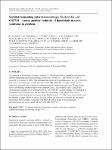Sorbitol-fermenting enterohaemorrhagic Escherichia coli O157:H− causes another outbreak of haemolytic uraemic syndrome in children
Alpers, Katharina
Werber, Dirk
Frank, Christina
Koch, Judith
Friedrich, Alexander W.
Karch, Helge
Heiden, Matthias an der
Prager, Rita
Fruth, Angelika
Bielaszewska, Martina
Morlock, Gabi
Heissenhuber, A.
Diedler, A.
Gerber, A.
Ammon, Andrea
An outbreak of haemolytic uraemic syndrome (HUS) among children caused by infection with sorbitol-fermenting enterohaemorrhagic Escherichia coli O157:H- (SF EHEC O157:H-) occurred in Germany in 2002. This pathogen has caused several outbreaks so far, yet its reservoir and routes of transmission remain unknown. SF EHEC O157:H- is easily missed as most laboratory protocols target the more common sorbitol non-fermenting strains. We performed active case-finding, extensive exploratory interviews and a case-control study. Clinical and environmental samples were screened for SF EHEC O157:H- and the isolates were subtyped by pulsed-field gel electrophoresis. We identified 38 case-patients in 11 federal states. Four case-patients died during the acute phase (case-fatality ratio 11%). The case-control study could not identify a single vehicle or source. Further studies are necessary to identify the pathogen's reservoir(s). Stool samples of patients with HUS should be tested with an adequate microbiological set-up to quickly identify SF EHEC O157:H-.
Dateien zu dieser Publikation
Keine Lizenzangabe

